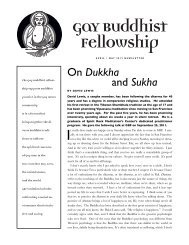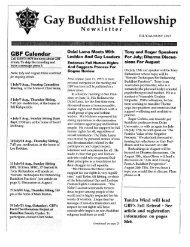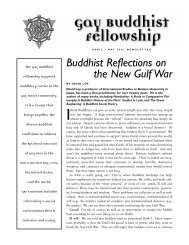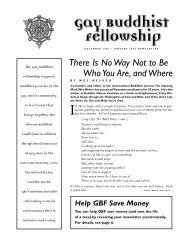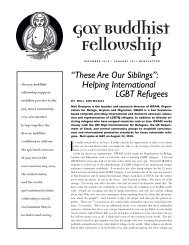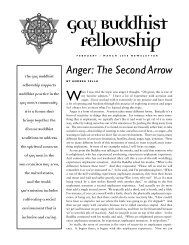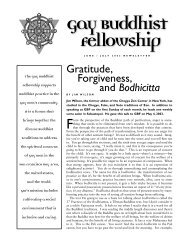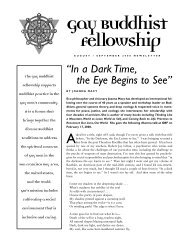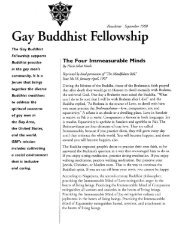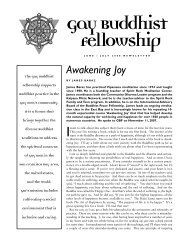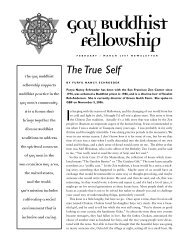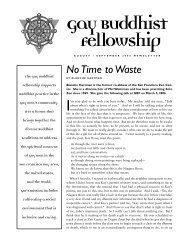2006.04 Eric Kolvig - Gay Buddhist Fellowship
2006.04 Eric Kolvig - Gay Buddhist Fellowship
2006.04 Eric Kolvig - Gay Buddhist Fellowship
You also want an ePaper? Increase the reach of your titles
YUMPU automatically turns print PDFs into web optimized ePapers that Google loves.
<strong>Gay</strong> <strong>Buddhist</strong><br />
<strong>Fellowship</strong><br />
A P R I L / M A Y 2 0 0 6 N E W S L E T T E R<br />
The <strong>Gay</strong> <strong>Buddhist</strong><br />
<strong>Fellowship</strong> supports<br />
<strong>Buddhist</strong> practice in the<br />
<strong>Gay</strong> men’s community.<br />
It is a forum that<br />
brings together the<br />
diverse <strong>Buddhist</strong><br />
traditions to address<br />
the spiritual concerns<br />
of <strong>Gay</strong> men in the<br />
San Francisco Bay Area,<br />
the United States,<br />
and the world.<br />
GBF’s mission includes<br />
cultivating a social<br />
environment that is<br />
inclusive and caring.<br />
<strong>Gay</strong> Sexuality<br />
and the Dharma<br />
BY ERIC KOLVIG<br />
<strong>Eric</strong> <strong>Kolvig</strong>, who teaches Vipassana Buddhism throughout the Western<br />
United States, has a special interest in sharing the dharma with lesbians<br />
and gay men. He gave the following talk to GBF on June 11, 1995. This transcript<br />
first appeared in the GBF newsletter in October of 1995.<br />
The Value of the <strong>Gay</strong> <strong>Buddhist</strong> <strong>Fellowship</strong><br />
Last weekend I co-led a retreat for lesbians and gay men at Cloud Mountain<br />
Retreat Center in southern Washington state. I asked what sort of dharma<br />
activity there is for lesbians and gay men in Portland, a nice, big metropolitan<br />
area. There is very little. So I have been reminded again of how very valuable<br />
and precious this <strong>Gay</strong> <strong>Buddhist</strong> <strong>Fellowship</strong> is. I am always conscious that this<br />
organization is here, doing a wonderful service for us gay men.<br />
Several gay men over the last few years have asked me to talk on the subject<br />
of gay sexuality and the dharma. Until now I've danced around this request,<br />
because sex is a controversial subject in our community. Despite the fact that<br />
this is a hot-button issue, I'd like to talk about sex and the Dharma this morning<br />
because so many people have wanted to know, “How can I bring my sexuality<br />
into my spiritual life and spiritual practice?”<br />
Some years ago I decided that I really needed to explore this aspect of my own<br />
life, as a way of integrating my sexuality into my dharma practice and dharma<br />
life. What I'll be sharing with you here is just what I've learned from this<br />
inquiry. My life is an unfinished project, a work in progress. What I've learned<br />
in this exploration is not what I will learn, and what you may be learning in<br />
your own journey in this respect may be quite different from what I have<br />
learned. I don't feel like an authority on the subject; I just want to share with<br />
you how my project is coming along. If it is useful, fine. If it is not, ignore it.<br />
And we may differ, but I think we can differ with respect.<br />
Sex Beyond Good and Evil<br />
The single most important thing for me on this subject of our sexuality and the<br />
dharma comes from the fact that the teaching of Buddhism is not a moral system.<br />
The Buddha's teaching is an ethical system, but it lacks the moral categories<br />
of right and wrong, good and evil, good and bad. There is no place for<br />
the idea of a bad or evil person or action in the <strong>Buddhist</strong> worldview.
We have all grown up with a very different, Western<br />
worldview that contains such moral categories as bad, evil,<br />
and shameful, and we have all been inculcated with those<br />
ideas from birth onward. The perspective of the dharma<br />
differs radically. The Buddha said that he was only concerned<br />
about suffering and the end of suffering—about suffering<br />
and happiness and making the choice for happiness.<br />
He would talk about what is “skillful” and “unskillful,”<br />
not about what is “good” and “bad.” Do you see this allimportant<br />
distinction? This is not just a philosophical question;<br />
it can have immense consequences in our lives. If we<br />
can shift away from the Western moral categories, a great<br />
shadow will lift from our hearts and spirits.<br />
to bestiality and child molestation. During the debate on<br />
gays in the military, the national coordinator of an organization<br />
called Back to the Closet said, “We will not stand<br />
idly by and watch the fascist perverts from hell sodomize<br />
our U.S. military.” Though these are extreme examples, we<br />
gays and lesbians get messages from this culture all the<br />
time that our sexuality is wrong.<br />
So it is really important to be clear that this judgmental<br />
perspective doesn't have any place in the worldview of the<br />
dharma. Our gay sexuality is fine, as long as we do not use<br />
it in ways that cause suffering to ourselves or to others.<br />
We all know this truth intellectually. But on more primitive<br />
levels of our consciousness, we all carry the shame and<br />
The Buddha's teaching is an ethical system, but it lacks the<br />
moral categories of right and wrong, good and evil, good and<br />
bad. There is no place for the idea of a bad or evil person or<br />
action in the <strong>Buddhist</strong> worldview.<br />
To the Buddha it is all a simple, clean matter of cause<br />
and effect. Certain kinds of actions lead to happiness,<br />
and others lead to suffering. If you want to be happy, if<br />
you want others to be happy, if you want to avoid suffering<br />
for yourself and for others, then do certain things<br />
and avoid doing other things. It's that simple. When we<br />
do something that causes suffering, we're not doing<br />
something bad, and we're not bad people. We're just<br />
causing suffering, period.<br />
There are no judgments in the Buddha's ethical system.<br />
Imagine a life free from moral judgments! It's really<br />
important to get this fact, because our society, as we<br />
know, has all kinds of judgments about sexuality. We<br />
have all been taught to feel shame about our bodies, their<br />
functions, and their sexual expression. In many different<br />
ways we get the message that sexuality is dirty or wrong.<br />
Even with all this shame, this schizoid culture is also full<br />
of graphic depictions of sex. Our culture has the worst of<br />
both fascination and shame; it is obsessed with sex, and it<br />
hates itself for that obsession.<br />
Wholeness in <strong>Gay</strong> Sexuality<br />
The dharma offers us a better way. If we want to find a<br />
way to bring wholeness to our spiritual and physical lives,<br />
we have to recast the way in which we look at our sexuality.<br />
This recasting is particularly important to us as homosexual<br />
people. Although all people in this society learn<br />
shame and guilt about their bodies and their sexuality,<br />
such shame and guilt have been laid on us gay folks with<br />
much greater intensity. Millions of people believe that<br />
homosexuality is evil. The language of the statewide antigay<br />
referendum in Oregon in 1992 stated that being gay is<br />
“immoral, wrong, unnatural, and perverse,” comparable<br />
the guilt that we have learned from this culture, which tries<br />
to divide our sexuality from the rest of our lives. By taking<br />
on the worldview of the dharma, we can bring our life<br />
into wholeness.<br />
Just one more thing about the guilt-tripping worldview.<br />
Clearly it seems like a good idea to jettison the<br />
moral categories that our Western upbringing forced<br />
into our consciousness, and to adopt the simple ethical<br />
stance of seeking to reduce suffering and increase happiness.<br />
But it's also true that a lot of our humor comes<br />
from playing around with those moral categories. For<br />
example, Mae West, one of the camp sexual icons of our<br />
century, said, “I used to be Snow White, but I drifted.”<br />
Whether or not Mae West fits into the <strong>Buddhist</strong> worldview,<br />
I hope that we can keep that funny play of naughtiness<br />
she was so wonderful at!<br />
The Buddha's Guidelines on Sex<br />
If you want to follow the ethical way of the Dharma, the<br />
Buddha's guidelines about sex are very simple. The Buddha<br />
talked about specific situations. For instance, he said<br />
that using our sexuality in ways that impose force, such as<br />
rape, is unskillful; it leads to suffering. He said that it is<br />
unskillful to have sex with people who are too young, or<br />
those who are developmentally challenged—anyone who<br />
lacks the maturity or clarity of mind to make a clear judgment<br />
and give informed consent. The Buddha also advised<br />
against having sex in such a way that a third person would<br />
be hurt. If you have ever been involved in a sexual triangle,<br />
you probably know how much suffering can ensue<br />
from that particular human tangle.<br />
Again, these suggestions are guidelines; they are not<br />
moral imperatives. There is no judgment involved. All we<br />
2 G B F A P R I L / M A Y 2 0 0 6 N E W S L E T T E R
are asked to do is to pay attention to how we use our<br />
speech and our actions. If we want to be liberated, we<br />
need to train ourselves to stop causing suffering in all our<br />
saying and doing, sexual and non-sexual.<br />
Repressing Sexuality Does Not Work<br />
A second thing that I have learned from my own exploration<br />
is that there seems to be no way to avoid dealing<br />
with our sexuality. Repression just doesn't work. Freud<br />
spent his whole professional life digging up the fascinating<br />
ways in which repressed sexuality becomes distorted and<br />
leaks out in weirdness.<br />
One of my teachers, Christopher Titmuss, was ordained<br />
as a celibate <strong>Buddhist</strong> monk in his early twenties in Thailand.<br />
He became friends with an old Thai in his midnineties<br />
who had been a celibate monk for 60 or 70 years.<br />
One day Christopher asked him, “You're now very old and<br />
close to death. You've been a monk all these decades, and<br />
you have done so many years of spiritual practice. What<br />
are the issues, the difficulties, that you work with in your<br />
life at this point?” The old monk answered, “Sex!” Suppression<br />
doesn't work.<br />
Some spiritual traditions—including my own, the<br />
Theravada/vipassana tradition—can encourage repressing<br />
our sexuality. One of the great Theravada teachers<br />
of this century, the Thai forest teacher Ajahn Chah,<br />
whom I respect a great deal, said to his monks, “You are<br />
better off putting your penis in a viper's mouth than to<br />
put it in a woman's vagina.” Well, with all respect, I'm<br />
not so sure. My point is that choosing celibacy should<br />
not mean ignoring our sexuality in the hopes that it may<br />
go away. It doesn't. Whether we express it in outward<br />
actions or not, we simply have to engage our sexuality,<br />
to deal with it.<br />
Though suppression doesn't work, for centuries or millennia<br />
we gay men have been obliged to suppress our sexuality<br />
because of the heterosexism, sometimes savage, of the<br />
cultures we have lived in. Recently someone showed me a<br />
home video of her travels in Italy that included a tour<br />
through a medieval torture chamber. Among the machines<br />
was a device designed specifically to kill gay men by impaling<br />
them. The time of repressing our sexuality is past. Now<br />
that our sexuality is out of the closet, it is not going back in,<br />
and I think we need to be very clear about that fact.<br />
New Age spirituality talks a lot about spirit, “attaining<br />
spirit.” That's fine, wonderful even. But with that focus,<br />
we run the risk of losing contact with our earthly lives.<br />
Shouldn't we aspire to attain body, too? Sexuality is one<br />
of our primary vehicles for attaining body and spirit<br />
together. The American poet Wallace Stevens wrote, “The<br />
way through the world is more difficult than the way<br />
beyond it.” More difficult, yes, but also more complete.<br />
Really, the way through the world is our task if we hope to<br />
be free and whole.<br />
Celibacy, Monogamy, Multiple Partners<br />
We can choose to deal with our sex in a variety of legitimate<br />
ways. And again, I don't think there is any moral<br />
judgment to guide our choosing or rejecting any one of<br />
them. We may choose celibacy as a way to deal with our<br />
sexuality, as long as we are truly dealing with it. I've been<br />
guiding the meditation practice of a gay Trappist monk in<br />
the Catholic tradition who has been in a monastery for<br />
many years. He tells me that he chooses to be actively celibate<br />
in his life right now because he wants to devote himself<br />
to the meditation practice in the monastery. I have<br />
questioned him about this choice, and he has said, “This is<br />
really right for me in my life, for right now.” So I have<br />
responded, “I really support you to do that. I made that<br />
same choice for myself back in the 1980s when I was doing<br />
a lot of intensive practice.” So celibacy seems like a valid<br />
choice if it works for people.<br />
Monogamy seems like a valid choice, too. That's what<br />
I'm choosing in my life right now, and its working very<br />
well for me. Having multiple sexual partners also seems<br />
like a valid choice for people, as long as they notice<br />
whether or not there is harm happening. Sexual addiction<br />
obviously harms us, like all addictions. Strengthening<br />
desire and craving in our minds can impede our spiritual<br />
path. But I can see how having multiple partners, while<br />
being awake to what is happening, can be a skillful choice.<br />
It is said that there was a prostitute named Pass-a-Million<br />
in the Buddha's time who continued to ply her trade after<br />
she became fully enlightened, enveloping each of her johns<br />
in vast loving kindness and compassion. From the point of<br />
view of the dharma, there is no right or wrong in this matter,<br />
only what is skillful or unskillful.<br />
Sexuality as Dharma Practice<br />
I would like to talk a little about the choices I have made<br />
about sexuality in my own life. Through most of the eighties,<br />
I chose to do intensive meditation practice for years at<br />
a time. I was powerfully drawn to that choice, which<br />
meant putting the rest of my life on hold, including my sexual<br />
life. I was in a celibate situation at a retreat center for<br />
years. I look back on that period and realize that this was<br />
a valid choice for me at the time.<br />
That all came to an end when I was in a year-and-a-halflong<br />
retreat at Insight Meditation Society in Massachusetts.<br />
During the warm months, I lived and practiced in a<br />
big tent deep in the forest, a beautiful place belonging to<br />
that retreat center. I was completely alone there, a hermit.<br />
I walked out to the meditation center for food once a day<br />
and spent the rest of my time in the remote forest. In many<br />
ways it was the happiest time of my life. My mind became<br />
very clear, calm, and open.<br />
I had kind of an erotic relationship to that forest world.<br />
It wasn't genital, but sometimes on a hot day I would take<br />
off all my clothes and walk through the woods with my<br />
G B F A P R I L / M A Y 2 0 0 6 N E W S L E T T E R 3
ody exposed to the sun, the shade, the touch of branches<br />
and leaves and the breeze for a mile and a half to an old<br />
reservoir. There I'd take a long swim and then walk back<br />
to the tent. It was just wonderful. I felt entirely connected<br />
to that world a trees, bird song, deer, and wildflowers.<br />
And then I fell in love with a fellow retreatant. He was<br />
straight, unfortunately, or rather I guess I should say “fortunately.”<br />
We were all sworn to celibacy, so there was no<br />
sexual contact. When I fell in love with this beautiful man,<br />
all of my suppressed sexuality came roaring through. Suddenly<br />
that tent in that exquisite forest became a prison,<br />
and I was miserable.<br />
I realized then that I was now at the stage in my life<br />
when I had to make sexuality and relationship my spiritual<br />
practice. I needed to pursue that practice with the same<br />
devotion and intensity that I had given to following my<br />
breath and doing other formal spiritual practices. A sage<br />
lesbian friend summed it up when she told me that I'd done<br />
a lot to develop myself spiritually, but now I needed to<br />
grow up emotionally. That was in 1989. Although I've<br />
done a fair amount of formal meditation practice during<br />
these intervening years, most of my energy for following<br />
the Great Way has been used for learning to relate skillfully<br />
and maturely to sexuality and sexual relationship.<br />
Meditation Improves Your Sex Life, and Rapture Is<br />
More Fun<br />
I'd like to share just a few of the things that I've learned<br />
along the way. A couple of them are really delightful. One<br />
is that doing meditation practice, especially doing a lot of<br />
it, really improves your sex life. The reason is simple:<br />
practice makes you more present. Vipassana is about<br />
being aware of things as they happen. If your mind is not<br />
distracted, wandering off, getting lost in thought, and<br />
being chaotic—but is here and aware—you can feel, and<br />
enjoy, sensations as they happen. You can feel energies<br />
passing back and forth with another person. You experience<br />
this powerful mind-body event less as an isolated self<br />
and more as a single, integrated field that includes both<br />
“you” and “other.” Your mind is concentrated, and so the<br />
experience is much more intense. My sex life has become<br />
a lot more fun, thanks to dharma practice, and I thank the<br />
Buddha for that gift.<br />
Another thing that I have learned, a delightful surprise,<br />
is the distinction between desire and rapture in sexuality.<br />
These two mind states, one unwholesome and the other<br />
wholesome, seem quite similar in some ways, but their<br />
effects on our lives are opposite. Let me give you an example.<br />
There are certain kinds of bodies that turn me on. I'm<br />
sure that it is the same for you. If I see one of those bodies<br />
running down the street, my head turns. Before I did a<br />
lot of meditation practice, desire often came up at such a<br />
moment. It's a really painful experience when you want<br />
somebody and you're not going to have him. The mind<br />
and heart contract painfully with grasping and longing.<br />
I've found that gradually, over time, and more and more<br />
now, rapture comes instead at such a moment. Rapture is<br />
one of the Seven Factors of Enlightenment, so it is powerfully<br />
benevolent and necessary for our minds to open. Rapture<br />
is that feeling of delighted appreciation, enjoyment,<br />
and interest you get when you see a beautiful sunset or the<br />
Grand Canyon or the green hills of early spring. Very<br />
often now when I see a beautiful body, my head still turns,<br />
but the feeling now is more like, “Oh, wow! Hooray!<br />
Thank you, God!” It's such a different feeling from desire,<br />
so open-hearted and open-handed, a delightful enjoyment<br />
of something beautiful, as opposed to that painful, grasping<br />
feeling. This does not mean that desire no longer<br />
comes up for me. It does still come. But it happens less<br />
and less. Instead, there is more and more simple delight at<br />
the flowering beauty of manhood.<br />
Seeing the Difference Between Physical Pleasure and<br />
Emotional Satisfaction<br />
Another crucially important and liberating distinction I<br />
have learned about my sexuality—extremely useful—has<br />
come from distinguishing what the body wants from what<br />
the heart wants. In vipassana practice, we talk about the<br />
important insight that meditators experience when they<br />
distinguish nama from rupa, mind from body, consciousness<br />
from material existence. The two are entirely interdependent;<br />
mind and body cannot exist independent of<br />
each other. Nonetheless, the two are also distinct and can<br />
be experienced separately. I realize that all this seems<br />
obvious intellectually, but when you experience it on a<br />
deep, intuitive level, all kinds of things start to happen<br />
from that understanding.<br />
As a result of spiritual practice, I have experienced a<br />
kind of sexual refinement of this insight into nama and<br />
rupa that has quite changed my life. I have come to understand<br />
that I had been confusing two things in sex. One<br />
was sexual pleasure, a physical thing. The other was emotional<br />
satisfaction or gratification, a thing in consciousness.<br />
Very often I had been going for the one in sex when<br />
I was really wanting the other but didn't know it. It is<br />
wonderful to be able to see that distinction between what<br />
the body wants—our sexual energies are a very primal and<br />
powerful force—and what the heart wants. I realized that<br />
what I wanted even more than to get my rocks off was to<br />
have a deeply close emotional connection to another person.<br />
I was really seeking the satisfaction of intimacy. It<br />
was so valuable for me to see that my compulsion for sex,<br />
for physical gratification, was masking my desire for emotional<br />
intimacy.<br />
Studies show that gay men are having unprotected sex<br />
partly out of low self esteem, but also partly out of a<br />
desire for intimacy. I work for an organization that is<br />
trying to stop the sexual abuse of children. Many stud-<br />
4 G B F A P R I L / M A Y 2 0 0 6 N E W S L E T T E R
ies have shown that people misuse children sexually out<br />
of a confused desire for intimacy. This is their muddling<br />
attempt to get away from the pain they feel of separateness<br />
and aloneness.<br />
Seeing that distinction has inspired me to seek a way in<br />
which the genitals and the heart can work together. Physical<br />
satisfaction in sex is wonderful. Emotional satisfaction<br />
is also wonderful. And how much more wonderful<br />
the experience of sex is for me when the two come together.<br />
Again, this is my own choice, and I don't suggest to you<br />
investigating it is the function orgasm has for me. In addition<br />
to providing a tremendous amount of physical pleasure,<br />
orgasm temporarily explodes the sense of a separate self.<br />
That escape from separateness is just what we are craving in<br />
our spiritual lives. I think that it is what we are craving in<br />
our sexual lives as well, whether we are conscious of it or<br />
not. To deal with our sexuality, we need to look at the pain<br />
of separation we all feel. It is the heart of our spiritual practice.<br />
We carry around with us constantly our root pain, the<br />
deepest pain of all, the sense of aloneness that comes from<br />
Doing meditation practice, especially doing a lot of it, really<br />
improves your sex life. The reason is simple: practice makes you<br />
more present. Vipassana is about being aware of things as they<br />
happen. If your mind is not distracted, wandering off, getting lost<br />
in thought, and being chaotic—but is here and aware—you can<br />
feel, and enjoy, sensations as they happen. You can feel energies<br />
passing back and forth with another person. You experience this<br />
powerful mind-body event less as an isolated self and more as a single,<br />
integrated field that includes both “you” and “other.” Your<br />
mind is concentrated,and so the experience is much more intense.<br />
that it is the right choice for everyone. For me, however,<br />
having a very close emotional bond in a sexual encounter<br />
intensifies the sexual pleasure.<br />
In my current monogamous relationship, my life partner<br />
and I have a nightly ritual of reading out loud together<br />
before we go to sleep. We crawl into bed without<br />
clothes, and I curl up on my partner's chest while he<br />
reads. We have just started the fourth volume of C.S.<br />
Lewis's Chronicles of Narnia. There is plenty of sex in<br />
our relationship, and that is satisfying to me. But curling<br />
up with safety on my partner's chest, enveloped in his<br />
love, and hearing his heartbeat as he reads to me, is the<br />
deepest image I have of this partnership. Everybody has<br />
a hungry heart. It seems important to know that as we<br />
reach for someone's crotch, we may also be reaching even<br />
more urgently for his heart. Knowing that fact can shift<br />
our whole relationship to our sexuality.<br />
Getting Beyond the Prison of Self<br />
And finally, just one other point. I feel that in order to look<br />
deeply at our sexuality and to deal with it, we need to look<br />
at the whole issue of our aloneness, our loneliness, the pain<br />
of separation we all feel. There is such valuable investigation<br />
to be done in this area; it is the heart of our spiritual<br />
practice. One of the things I've discovered in my own life by<br />
the ego delusion that we are separate selves. Consciously or<br />
unconsciously we are drawn to getting past that sense of<br />
separateness and finding an experience of union and wholeness.<br />
Union is our true home, and we all ache, knowingly<br />
or unknowingly, to go home to it. That is what happens in<br />
our spiritual practice. That is what enlightenment is. It is a<br />
blasting away of that sense of a separate self.<br />
I think that a little moment or foretaste of freedom can<br />
occur in orgasm, too. For a moment our self-consciousness,<br />
our sense of separate existence, can be blown away.<br />
And then we come back. Perhaps the sadness that can<br />
come after orgasm may be our reaction as we come back<br />
into the prison of ourselves, after having that experience—<br />
beyond happiness, in a sense—where the sense of self is<br />
either attenuated or briefly disappears.<br />
So perhaps one of the main reasons we can be compulsive<br />
or addictive sexually is to experience, over and over<br />
again, that moment's sense of no-self that orgasm can<br />
bring. If we see that motivation, we can realize that our<br />
sexuality and our meditative practice can work together.<br />
Because ultimately, it is all about non-separation, about<br />
ending the painful apartness we feel and going home.<br />
May we all find a way to make every part of our lives,<br />
including our sexuality, serve our highest purpose, our liberation<br />
from all suffering.<br />
■<br />
G B F A P R I L / M A Y 2 0 0 6 N E W S L E T T E R 5
GBF<br />
STEERING COMMITTEE<br />
Paul Albert<br />
Michael Langdon<br />
Paul Shepard<br />
Peter Washburn<br />
TREASURER<br />
Teng-How Bae<br />
NEWSLETTER<br />
Editor<br />
Michael Langdon<br />
Contibutingng Editor<br />
Roger Corless<br />
Design / Layout<br />
Michael Gabel<br />
Mailing List<br />
Todd Pope<br />
Newsletter Mailing Party<br />
Jack Busby<br />
Transcriber<br />
Jim Stewart<br />
Mail<br />
Bob Seidle-Khan<br />
HAMILTON HOUSE<br />
Volunteer Coordinator<br />
Clint Seiter<br />
PRISON OUTREACH<br />
Coordinator<br />
Don Weipert<br />
WEBSITE<br />
Webmaster<br />
Joe Kukulka<br />
SUNDAY SITTINGS<br />
Program Committee<br />
Paul Albert<br />
Howard De Porte<br />
Baruch Gold<br />
Darren Little<br />
Jim Stewart<br />
Facilitator Coordinator<br />
Paul Shepard<br />
Facilitators<br />
Howard De Porte<br />
David Holmes<br />
Bob Lehr<br />
Paul Shepard<br />
Jim Stewart<br />
Bob Seidle-Khan<br />
Host Coordinator<br />
Kai Matsuda<br />
Hosts<br />
Cass Brayton<br />
Peter Camarda<br />
Steve Carson<br />
Jay Corbett<br />
Francis Gates<br />
Richard Hedden<br />
Kai Matsuda<br />
Carl Minns<br />
Todd Pope<br />
Sound / Recordings<br />
CJ Grant<br />
George Hubbard<br />
Steering Committee<br />
Needs New Members Now<br />
In the last few months, three long-term members of the Steering Committee<br />
have stepped down, and there may be other retirements this year. Since most of<br />
the remaining members have served for over four years, the committee is in need<br />
of some fresh perspectives. The Steering Committee meets four times a year<br />
after the regular Sunday morning meeting to take care of the business of the<br />
Sangha. (Some additional business is done by e-mail.) If you attend somewhat<br />
regularly, consider what the Sangha has given to you and how you might give<br />
thanks through service. Although we hope that volunteers will serve for at least<br />
a year, a term on the Steering Committee is not life-long, nor does it require a<br />
huge time commitment. (In fact, service on the Steering Committee usually<br />
involves no more than ten hours a year.) If you're interested in serving, please<br />
contact one of the current members of the Steering Committee.<br />
The Fall Retreat Dates Set<br />
GBF will have its annual fall retreat during the weekend of October 13-15. We<br />
will return to the beautiful Vajrapani Institute in Boulder Creek, California.<br />
The retreat will start Friday evening and will conclude after lunch on Sunday.<br />
Watch out for registration information in a future issue of the newsletter.<br />
Annual GBF Hike to Chimney Rock<br />
Has another year already gone by? Okay, guys, it's time once again for GBF's<br />
famous and spectacular spring wildflower hike/potluck picnic at Chimney Rock<br />
in Point Reyes Park on Saturday, April 29. Chimney Rock is famous among<br />
Nature lovers for its incredible springtime displays of wildflowers. Drake's Bay<br />
on one side and the Pacific Ocean on the other provide dramatic backgrounds.<br />
We might also visit the Point Reyes lighthouse. The hike is short (about a mile<br />
each way), but the drive up, while beautiful, isn't; be prepared for an all day<br />
excursion. This will be a potluck picnic, so please bring a dish to share with others.<br />
We will be carpooling from the GBF Center (37 Bartlett St.) at 9:00 a.m.<br />
Bring warm clothing (it gets windy up there), a blanket, and sun block. Rain<br />
cancels. For more information, call Clint Seiter at (415) 386-3088.<br />
Mount Tam Wildflower Hike<br />
Saturday, May 27<br />
Now that we've explored Chimney Rock, let's do a wildflower hike on Mt.<br />
Tamalpais as well. Just a half hour north of San Francisco, Mt. Tam offers some<br />
of the most spectacular hikes in the Bay Area. This particular hike will be about<br />
four miles long, with modest gradient increases and decreases. The first half<br />
will be in exposed areas offering sweeping views of the Pacific and San Francisco<br />
off in the distance (and the wildflowers should be plentiful this year). We'll<br />
loop back through the redwoods, in shade. Pack a lunch, water, sunscreen and<br />
a jacket (in case it gets breezy). We will meet in front of the GBF center (37<br />
Bartlett St.) at 10:00 a.m. and car pool out. Rain cancels. For further information,<br />
call Clint at (415) 386-3088.<br />
Sign up for the GBF Directory<br />
GBF is compiling data for a printed directory of its members. To be included in<br />
this you may send your name, address, phone number, and e-mail address to<br />
gbfmailinglist@sbcglobal.net. If you are self-employed and offer a service, you<br />
may list that service along with a descriptive word or phrase, e.g., attorney,<br />
landlord and tenant law. Deadline for entries is June 30. We hope to publish<br />
the directory this summer.<br />
6 G B F A P R I L / M A Y 2 0 0 6 N E W S L E T T E R
Calendar<br />
Sunday Speakers<br />
April 2<br />
Robina Courtin<br />
Ven. Robina Courtin was ordained as a Tibetan <strong>Buddhist</strong> nun at Kopan Monastery in 1978. She<br />
has worked full time since then for Lama Thubten Yeshe and Lama Zopa Rinpoche's Foundation<br />
for the Preservation of the Mahayana Tradition. She is now director of Liberation Prison<br />
Project, which supports the <strong>Buddhist</strong> practice of thousands of prisoners in the USA and Australia.<br />
April 9<br />
Clint Seiter and Jack Busby<br />
Clint Seiter has been a member of GBF for approximately sixteen years. His first introduction<br />
to Buddhism was through the Zen community in the Green Gulch Zen Center in Marin (where<br />
he has been the head muffin maker for seventeen years). For the past nine years, Clint has also<br />
headed the GBF “Feed-The-Homeless” project, which plans and prepares monthly meals for<br />
the Hamilton Family Center (a shelter for homeless families). Clint's spiritual path also includes<br />
the Diamond Heart program and the teachings of Ken Wilber.<br />
Jack Busby, a member of GBF for more than a dozen years, was born and bred in the Middle<br />
West, where he was a sincere but not rabid Christian fundamentalist. Living in San Francisco<br />
since 1981, he has practiced Vipassana meditation, architecture, and tap dance, though not<br />
at the same time. He will be happy if anyone benefits from hearing about his life experience<br />
since he is still puzzling it out.<br />
April 16 Larry Barnett<br />
Larry Barnett has been a member of the Sonoma City Council for the past twelve years, and<br />
has twice been Mayor of Sonoma. His exposure to Buddhism began in 1974 with his attendance<br />
at Fort Mason of the Black Hat ceremony of the Sixteenth Karmapa, and he recently became<br />
a co-director of the Sonoma Shambhala Meditation Center, one of the 150 world-wide Shambhala<br />
centers inspired by lineage of the Vidyadhara Chogyam Trungpa Rinpoche and the current<br />
spiritual director of Shambhala, Sakyong Mipham Rinpoche. His topic will be "Politics as a Spiritual<br />
Practice...You've got one hell of a Nirvana!"<br />
April 23 Roger Corless<br />
Roger Corless is Professor of Religion, Emeritus, at Duke University. Having retired to the Bay<br />
area, he contributes to the GBF Newsletter under the nom de plume Dharma Daddy. Roger<br />
will kick off our spring “unit” on addition/attachment/liberation with a talk on “Samsara as<br />
Addiction.”<br />
May 7<br />
Padmadharini<br />
Padmadharini has practiced in the tradition of the Friends of the Western <strong>Buddhist</strong> Order<br />
(FWBO) since 1989 and was ordained into the Western <strong>Buddhist</strong> Order (WBO) in 2004. She<br />
is actively involved in the spiritual direction of the San Francisco <strong>Buddhist</strong> Center, where she<br />
teaches meditation and leads Dharma courses.<br />
May 14<br />
Peter Washburn<br />
Peter Washburn received his undergraduate and medical degrees from the University of Pennsylvania.<br />
He completed his residency training in Internal Medicine in the Navy, where he first<br />
got involved—some thirty years ago—in what is now called Addiction Medicine. He completed<br />
a two-year fellowship in Substance Abuse at the SF VA Medical Center and currently<br />
works for Kaiser SF in its Chemical Dependency Recovery Program. His talk is not strictly a<br />
dharma talk but rather a user-friendly review of current thinking regarding the Medical-Scientific<br />
model of addiction. He has been a member of the GBF for the last ten years.<br />
May 21<br />
Paul Shepard<br />
Paul Shepard has been in recovery and concurrently practicing vipassana meditation for sixteen<br />
years. An active member of GBF for over ten years, he initiated focus groups on Sexuality and<br />
Spirituality in 1998 and 1999 and has written major articles for the GBF Newsletter (10/99 and<br />
6/05). Paul is a graduate of the <strong>Buddhist</strong> Alliance for Social Engagement (BASE) training, a program<br />
of the <strong>Buddhist</strong> Peace <strong>Fellowship</strong>. He has a sex addiction counseling practice in Oakland,<br />
where he shares a living space with his dog Bodhi(sattva). He will talk on “Sex Addiction:<br />
Recovery as a Practice.”<br />
Warning: This is the Sunday of the Bay to Breakers Race, so if you are coming from Marin or<br />
the north side of town, the only way across town is Park Presidio through the Golden Gate<br />
Park.<br />
May 28<br />
All Sangha Discussion<br />
Discussion of Experiences of Attachment and Liberation<br />
Warning: This is Carnival Sunday, so parking will be less welcoming than usual. Plan in advance<br />
to come early so that you can share your story of liberation.<br />
Sunday Sittings<br />
10:30 am to 12 noon<br />
Every Sunday followed by a talk or discussion,<br />
at the San Francisco <strong>Buddhist</strong><br />
Center, 37 Bartlett Street (near 21st St<br />
between Mission and Valencia).<br />
MUNI: 14 Mission or 49 Van Ness-Mission,<br />
alight at 21st St, walk 1/2 block.<br />
BART: 24th and Mission, walk 31/2 blocks.<br />
PARKING: on street (meters free on<br />
Sundays) or in adjacent New Mission<br />
Bartlett Garage. The Center is handicapped<br />
accessible.<br />
Miss a Dharma Talk?<br />
You can listen to it on the Internet.<br />
Audio files of Dharma talks are available<br />
on the GBF website.<br />
How to Reach Us<br />
World Wide Web Site<br />
www.gaybuddhist.org<br />
For general questions about GBF<br />
write to:<br />
inquiry@gaybuddhist.org<br />
To reach our Program Committee<br />
with suggestions for speakers and<br />
comments, go to:<br />
www.gaybuddhist.org/programs<br />
Mail correspondence:<br />
GBF<br />
PMB 456<br />
2215-R Market Street<br />
San Francisco, California 94114<br />
For address changes or to subscribe<br />
or unsubscribe to the Newsletter<br />
send email to:<br />
mailinglist@gaybuddhist.org<br />
GBF Newsletter<br />
Send submissions to:<br />
editor@gaybuddhist.org<br />
GBF Yahoo<br />
Discussion Group<br />
There is now a GBF discussion<br />
group for the general membership<br />
(and others) on Yahoo.<br />
Join the discussion at:<br />
www.groups.yahoo.com/group/gay<br />
buddhistfellowship<br />
G B F A P R I L / M A Y 2 0 0 6 N E W S L E T T E R 7
GBF NEWSLETTER<br />
PMB 456<br />
2215-R MARKET STREET<br />
SAN FRANCISCO CA 94114<br />
ADDRESS SERVICE REQUESTED<br />
By the power and truth of this practice, may all beings have<br />
happiness and the causes of happiness, may all be free from sorrow<br />
and the causes of sorrow, may all never be separated from the sacred<br />
happiness which is without sorrow, and may all live in equanimity,<br />
without too much attachment or too much aversion, and live<br />
believing in the equality of all that lives.<br />
—GBF Dedication of Merit



